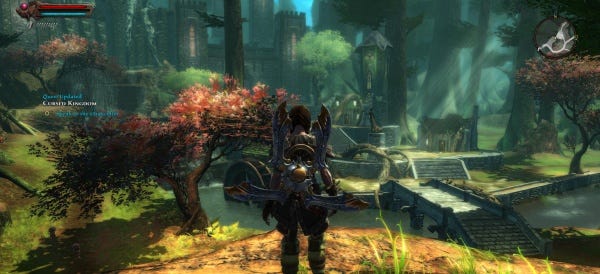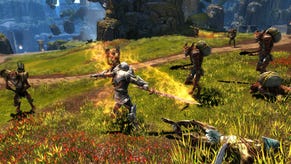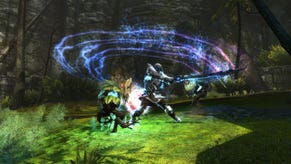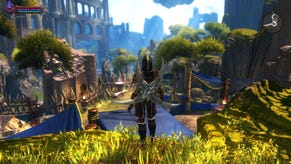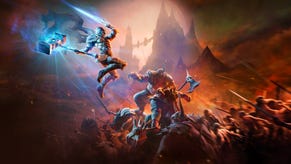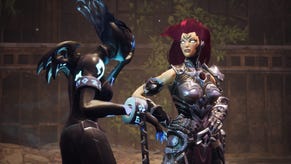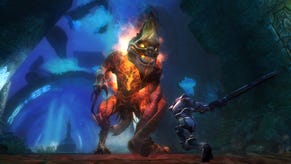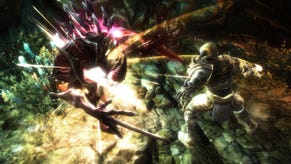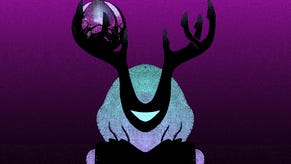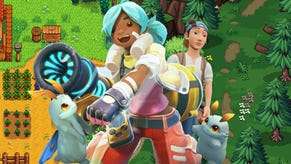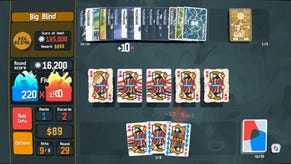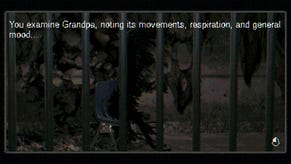Why Didn't Everyone Play Kingdoms Of Amalur?!
Reckoning
There's a game you probably didn't play. It came out last year, it's a genuine epic, a vast, elaborate RPG with a sprawling story and vast numbers of sidequests. It features superbly in-depth combat, has huge variety in character design and levelling, and lets you instantly wander from the main plot and explore its enormous world to your own entertainment. It's Kingdoms Of Amalur: Reckoning.
I remember attending a press day in late 2011, looking at a selection of EA games, and Amalur was there. But no one suggested I take a look at. In a quiet moment I snuck onto one of the long row of empty PCs to have a go, found myself intrigued, and then was angrily told to stop by an EA representative. Playing unsupervised, tsk. That was as close as I got.
A week and a half ago I was trying to get onto the SimCity beta weekend, but Origin was falling to pieces, servers down, logins impossible. And I saw Amalur there, downloaded to my PC, on a whim from a while back and never explored. For whatever peculiar reason, the set of EA servers that allowed that game to check in on itself worked, and after some moronic requirement to "authenticate" my PC, two separate EULAs, and yet more logging in, I was able to get to a game menu. I've not stopped playing since.
I must have put in a couple of dozen hours in the last week or so. And by the map, I'm maybe just over halfway exploring the world, so halfway through the main story, the three separate faction quests I've found so far, and the 60 or so sidequests I've completed. I'm so hooked, so completely drawn in to its fantasy world, and I've no desire to stop. I've little desire to do anything else but keep playing. I want to start to explore why.
It's also important to note that Amalur is riddled by bugs. Amazingly stupid bugs that in no way should ever have cleared testing. Bugs like the quest screen completely falling to pieces and going blank once you've about 20 quests running (something that's unavoidable). And of course bugs that, now creators 38 Studios and Big Huge Games no longer exist, will never be fixed. Yet despite this, it's still incredibly robust for a game of its scale, and especially for a game that offers you an extraordinary amount of freedom.
While there's much to criticise, there's far more to celebrate. This is a really fantastic game, bursting full of story, combat and exploration, and yet you probably didn't play it.
Amalur is impressive on a number of levels. The two most important are its distilling of the very best of an action-RPG MMO into a single-player game, and its meta-commentary on the very nature of games. But don't be put off by either! No, really, don't! I want to explore those two.
It's not a surprise that the game should have so many similarities with a game like World Of Warcraft. Of the two teams that made it, 38 Studios and Big Huge Games, the former was already working on an MMO. The doomed developer, with all that money via the deals of baseballist Curt Schilling, had been developing a massive universe along with author R.A. Salvatore, with a 10,000 year history, and all the background needed to create an ongoing, online game. After 38 bought BHG, along with them came not only the Big Huge Engine, but an RPG they'd been working on for THQ. The two, like the studios, were combined. Goodness knows what either might have been, but the combination is a purely single-player RPG with the depth and breadth of an online world.
We're talking Dragon Age: Origins scale here, but in a far freer, far more open world. While you do eventually navigate its enormous stretches through the map's quick travel, you could still run anywhere too. It's all open, all connected, and all packed with so much going on.
The other tempting comparison is Skyrim, and that megalithic RPG having come out just a couple of months before can't have done sales of Amalur any favours. But it's definitely an inappropriate comparison. Yes, you can ignore the main plot, yes, you can kill absolutely anyone, anywhere, and still have the game somehow cope, and yes, it has the most stupidly designed inventory menus imaginable. But the atmosphere, the tone, the intangible feel of it all - to compare it feels weirdly wrong. It's something much brighter, something much more accessible.
That's hugely helped by its being a third-person action game. Combat is true to that too, relying on some healthy button mashing and frantic dodging. Big fights with giant creatures are chunky, satisfying brawls, as you hammer away at the A button (yes, I picked 360 controls for this, and with the wayward mouse it's definitely the better option, and the one with which the game was obviously primarily designed to be played), throwing in shield blocks, dodging rolls, and your array of special abilities, spells, and old-school button combo moves.
For me, what's made this especially special, is it's the first time I've ever bothered to properly engage with a game's blocking mechanic. Like how most fun action-driving games really never need you to press the brake, most action-combat games never really need you to bother with blocking. There are ways, means, hammering of buttons that generally get around such a faff if you're as lazy as me. But here it's so damned rewarding, so absolutely satisfying every time you time it perfectly, that I'm finally converted. I'm actually slowing down for the corners, rather than bumping off the barriers at the side.
But when a game like this has such an emphasis on the combat, invariably that means the RPG side of things is watered down. Action-RPGs, the Diablo-mould creations, tend to have wispy plots, little chats to be had in hub towns, then back to the biffing. But that's absolutely not the case in Amalur. You could easily spend an entire evening nattering away with the residents of a newly discovered city, exploring the side-streets for those in trouble and needing your help, negotiating with bigwigs, exchanging loot for new equipment, handing in completed quests, discovering secret treasures in dungeons hidden behind a house's backrooms, stealing all the valuables from everyone's bedroom drawers, and gathering a new armful of tasks to complete in the surrounding area.
Then off you go, aiming toward quest markers, having spots of combat along the way, until you're inevitably distracted by an intriguing looking building, or dead body containing some odd clue, or pathway leading to an enclosed area, and so on. That measure by which I test all RPGs for goodnessity - the impossibility of actually going where you intended without getting waylaid - is triumphantly ticked here in a big thick red marker pen.
When I began playing, I realised that I'd started this game once before. I vaguely recognised the opening moments - being dead and wheeled in a cart to a heap of other deads, interwoven with the character creation. Then waking up, alive again, and escaping the odd place you're in. I recalled the stuff about Fateweaving, about how Fateweavers determine the fixed paths of our futures based on the magical nature of Fate, but that I had no path, that I was different. I remembered the opening village, the dying blue woman on the ground, and then I must have been distracted by a bee in a jaunty hat, because there my recollection ended. But perhaps because I'd seen this village previously, rather than focusing on the stories being set up there, I charged off up a hill toward a pretty looking stone. And from there across some fields, until I discovered another blue character - one the Fae (basically, elves) - who asked me to do a thing that directed me, in stages, toward the Elv- Fae city. I ended up getting embroiled in their story, rather than the main plot, for a long time.
The Fae are immortal. Sort of. They die, sort of routinely, but then come back to life and repeat their cycles. The Cycle, in fact, is the key to Fae culture. Because they are their own history (although that gets complicated too), they retell the same existences as stories, endlessly looping their reality, their lives being the folktales they tell. That's just brilliant. And it's the first part of this game's commentary on the nature of storytelling, and the invasion of a player. Because things aren't following the correct patterns. The cycles aren't looping, and baddie Faes are taking advantage of this, manipulating the changes to see themselves come to power. The endless battle between the Winter and Summer courts of the Fae are beginning to change their determined outcomes, the Winter Fae starting to win where they should lose. And it seems to have a lot to do with you, and why you don't obey the rules of Fate.
It's not just the Fae this applies to. They have a broader perspective of the other races, especially the humans, nicknamed by Fae as "dustlings". Their lives too are pre-determined, although they may live in denial of this. Because they're all NPCs, right? Gettit? And yes, in my just stating it in some words it may seem a little trite, but the game doesn't spell it out so obviously. There's no elbow-nudging. Instead it's just a lovely, underwritten acknowledgement of the nature of the player, the person who comes in and changes the inevitability of the course of all their lives.
Which might usually be something that's rather undermined by the game's inevitably being linear. Yet Amalur gets away with this too. Yes, it says, this is a linear path. You are on this route, this is your destiny, and that's the nature of life. Except as you travel this path, the outcomes of your actions are not fixed. That's true in the decisions you might make in a minor sidequest, whether to help him, or her, and the small-scale consequences of that. And it's true in what the game calls Twists Of Fate - key points in which you (not knowing they're key points, crucially) make a decision that dramatically changes the course of history.
I, for instance, am now ruler of the House Of Ballads, one of the highest positions in Fae kind. And I'm not Fae! What manner of madness! Also, my defiant Atheism (I'm roleyplaying!) has led to my being declared an Unwritten One, further determining my own future. (Although I've somewhat undermined that by pretending to become a follower of Lyria because I wanted the XP - elsewhere in the game I've been given the conversation option of lying when it comes to such matters, this time it didn't.)
I don't yet know how far this commentary will reach, or whether it will fade aside to let the more generic fantasy tropes that permeate all come fully to the front. Because in honesty, for most of the time, for the ten thousandth time you're looking for the ten thousandth person reported missing after they wandered off into Deadlytraps Dungeon or the like. Most of the time it's political machinations between pretend clans of people you didn't know existed last week, and so are hard-pushed to care too much about now. In fact, and perhaps super-meta-archly-appositely, I more often find myself siding with whomever I think will lead to a more interesting outcome. Were they planning that? I don't think they were planning that. But still, it's happening.
Also, I SO love the woodpecker-like sound it makes when your magically restoring quiver of arrows refills.
I have so much to say about this game. I'm very aware that this is madness, extensively writing about a game that came out a year ago that everyone ignored, from a studio that no longer exists. But dammit, if I can convince a handful of people to pick up a copy, then I'll be happy. I want to talk about how it embodies everything that's great about the RPG, as well as how it embodies everything that's completely ridiculous. So next time, how I accidentally killed the entire population of a monastery.
